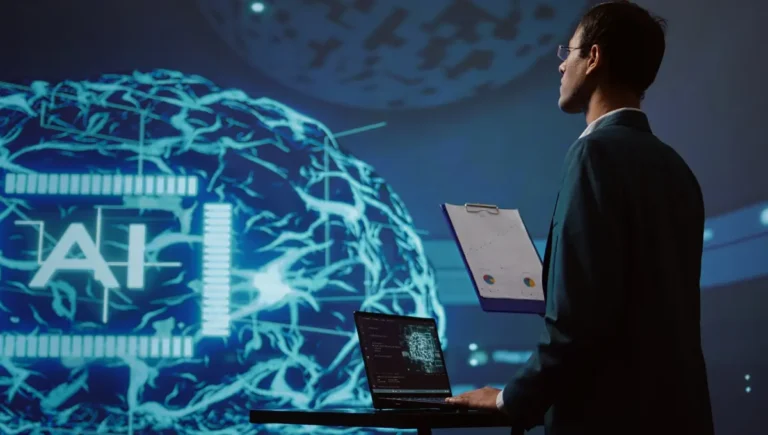Artificial intelligence (AI) is one of the most promising technologies in the world today. With its innumerable applications, it has the potential to change our lives in many ways, and it has different possibilities to make a positive impact on our society as well. AI can be used in many different fields and industries, but it can also be used to reshape business ecosystems. For a deeper dive into various artificial intelligence technologies, check out our comprehensive guide.
Artificial Intelligence (AI) is the idea that machines can be intelligent, which is to say, the ability to solve problems through learning and reasoning. AI has existed for a long time, but it wasn’t until recently that we started developing true artificial intelligence that enhanced business operations. Nowadays, in business, it is not only used to automate tasks, but also to make business decisions that would be otherwise impossible. For more on how AI and machine learning (ML) are intertwined, explore our article on AI and ML.
Moreover, artificial Intelligence has many applications in business and will continue to play an important role in future business growth and sustainability. The use of AI in business also has the potential to improve efficiency, productivity and revenue. To better understand the terms and concepts related to AI, refer to our list of most common AI terms.
What is Artificial Intelligence (AI)?
Artificial intelligence (AI) is a field of computer science that involves the development of computer systems able to perform tasks that normally require human intelligence, such as visual perception, speech recognition, decision-making and translation. AI’s scope includes machine learning, statistical analysis and computational logic, in addition to traditional subfields such as computer vision and machine learning.
Artificial intelligence has developed in a number of different areas, including autonomous robots, expert systems (which are intended to emulate human experts), speech recognition, and machine learning.
Artificial intelligence began with early researchers attempting to make computers exhibit the level of thought displayed by humans. A number of precursors were proposed throughout the 1930s and 1940s. Later work expanded to encompass linguistics, statistics, cognitive psychology, robotics and computational theory.
Reshaping Business Eco-system With Artificial Intelligence
Artificial Intelligence has been a part of many developments in business over the years. One such example is IBM Watson which was first released back in 2011. Since then, it has been used in many industries, including healthcare and banking services.
Artificial Intelligence is not just limited to the enterprise ecosystem, it can also be applied to other sectors as well, like doctors who can use neurotechnology devices so they can better understand their patient’s needs at any given time.
So how can Artificial Intelligence really reshape the business eco-system?
AI Can transform businesses with Data Collection, Predictive Analysis and Deep Learning.
1) Data Collection
The most important element of artificial intelligence is data collection. In order to solve problems, AI needs data from various sources such as sensors and devices, databases, etc., which need to be analysed and processed in order for them to provide accurate results. The more data you have on hand, the better your automated system will work. For insights into how no-code AI platforms facilitate this process, see our article on no-code AI.
2) Predictive Analysis
In addition to data collection, artificial intelligence can also be used for predictive analysis and decision-making. Predictive analytics allows companies to predict what customers will do next based on their past behaviours and preferences so they can serve them accordingly based on their needs and preferences rather than just reacting on an immediate basis when something happens or if they notice something unusual happening on their screens while they are using it at home or even online while using a mobile application etc.
3) Deep Learning
There is deep learning, which is what most people think of when they hear about AI, but there are other kinds of AI, too, like scenario planning and reinforcement learning. These are more advanced forms of AI that allow humans to interact with computers in a more natural way than just simple commands or instructions would allow for. Deep learning acts like a human brain would by learning through experience and repetition over time. This means that if you give your computer enough data, it will eventually learn how to solve problems independently without having any human assistance!
How can artificial intelligence reshape business ecosystems to foster sustainability and growth?
Artificial intelligence is a subset of computer science that aims to create intelligent machines. It has been widely used in different fields, including business, medicine, military, and consumer products. With the help of AI, we can achieve a lot of things like creating smart cities, intelligent robots and even self-driving cars.
Artificial intelligence is becoming increasingly important for businesses because it allows them to use data to improve their performance and make better decisions. In addition, artificial intelligence helps automate various processes so that humans can focus on other tasks. It has also been imperative in fostering sustainability and growth in three main ways.
- First, AI can be used to help companies reduce their environmental footprint. For example, companies like Nestle, Walmart and Google are using AI to identify ways in which they can reduce water consumption and waste.
- Second, AI can be used to increase customer satisfaction. In a recent survey from Adobe, companies were asked what was most important for their customers. The top answer was that customers want companies to focus on delivering a great experience for them.
- Third, AI can be used to improve employee performance and engagement. IBM Watson has been used for this purpose by many different companies, including Apple and Microsoft.
Conclusion
The report, “Artificial Intelligence for Sustainability: The Business Case for AI,” evaluated more than 100 companies across six industries that are using AI to help them develop a more sustainable business model. The C40 Cities Network is a global network of over 1,000 cities committed to improving their citizens’ quality of life through coordinated action on climate change, social equity and environmental sustainability.
In order to calculate the potential benefits of AI-enabled sustainability efforts, Accenture partnered with C40 Cities Network to conduct a survey of its members on how they use AI in their day-to-day operations. The results showed that nearly 70% of respondents said they have already implemented some form of AI into their business strategies and processes.
Therefore, this can conclude that companies that invest in AI services would be able to manage their costs better while boosting productivity and efficiency. They also noted that companies with a strong sustainability track record tend to have stronger sales numbers than their competitors who haven’t invested in these technologies.




